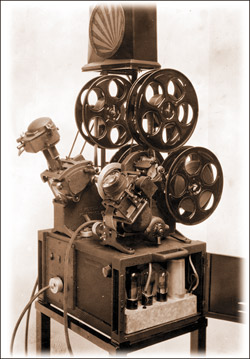Continuity Style and Film Editing Techniques
 Continuity style is a series of conventions about camera movement and editing that are intended to make movies seem natural by maintaining continuous and clear narrative action. When it works right, continuity style is invisible.
Continuity style is a series of conventions about camera movement and editing that are intended to make movies seem natural by maintaining continuous and clear narrative action. When it works right, continuity style is invisible.
Next: Film v Theater
 This is a TEACH YOURSELF section of the course. Leave yourself adequate time to master it. It includes the cinematography and editing concepts and the two short films listed below. (Minimum read/watch time 35 minutes. Maximum about 2-3 hours)
This is a TEACH YOURSELF section of the course. Leave yourself adequate time to master it. It includes the cinematography and editing concepts and the two short films listed below. (Minimum read/watch time 35 minutes. Maximum about 2-3 hours)
Click here for two pages that will give you definitions and examples of the cinematography and editing terms you're responsible for.
Cinematography Terms |
Editing Terms |
| Depth of Field |
Establishing Shot/ Reestablishing shot |
| Deep Focus |
Shot/Reverse Shot |
| Shallow Focus |
Cross Cutting/ Parallel Editing |
| Pan |
Eyeline Match |
| Tilt |
Match on Action |
| Tracking Shot |
180 Degree Rule |
| Following Shot |
Cut in / Cut Away |
| Point of View Shot |
Dissolve |
| Crane Shot |
Cheat Cut |
| Steadicam |
Jump Cut |
| Hand Held Camera |
|
After you've studied up on your terminology, please watch the following two short films from Taylor Ramos and Tony Zhou's "Every Frame a Painting"
Shot-Reverse Shot (length: 7:05, Required)
Lateral Tracking (length: 6.29, Required)
BTW, the photo on this page is a Moviola, a device invented in 1924 to allow editors to view a film during the editing process.
 Continuity style is a series of conventions about camera movement and editing that are intended to make movies seem natural by maintaining continuous and clear narrative action. When it works right, continuity style is invisible.
Continuity style is a series of conventions about camera movement and editing that are intended to make movies seem natural by maintaining continuous and clear narrative action. When it works right, continuity style is invisible.  This is a TEACH YOURSELF section of the course. Leave yourself adequate time to master it. It includes the cinematography and editing concepts and the two short films listed below. (Minimum read/watch time 35 minutes. Maximum about 2-3 hours)
This is a TEACH YOURSELF section of the course. Leave yourself adequate time to master it. It includes the cinematography and editing concepts and the two short films listed below. (Minimum read/watch time 35 minutes. Maximum about 2-3 hours)